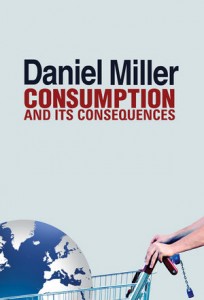My guest in this programme is Professor of Material Culture at UCL, Daniel Miller. Daniel appeared in an earlier Polity Books podcast to talk about his previous book, Tales from Facebook, which looked at how people really use Facebook as a form of social interaction, as opposed to how media commentators would have us think they use it. In his new book, Consumption and its Consequences, Daniel takes a similar approach, examining how we behave as consumers by paying close attention to what we do, rather than heeding received ideas about consumption.
Of course, with consumption, the stakes are potentially very high, as our patterns of consumption have direct bearing on the earth’s resources and its climate. So the questions Daniel addresses here, while informed by academic research, are of much more than just academic interest. Understanding how and why we consume is, the book argues, a prerequisite for finding ways to consume without completely exhausting our planet’s resources. And to pursue these issues, Daniel opens and closes the book with an imaginary three-way conversation between advocates of different approaches to consumption. So it is more than an academic book in both its form and content.
To listen to the complete interview, click here. To hear extracts, click on the links below.
1. I began by asking Danny about this book in relation to his earlier work. Click here for his response [1:44].
2. “We’ve used the material world as a stick to beat ourselves with”. Daniel Miller on contesting the unrelievedly negative view of material culture. Click here [2:40].
3. “Everybody’s decided in a sense what consumption is without really going out there and being open-minded and going out there to ask ‘what do people actually seem to be doing?'”. Danny Miller on the contribution of anthropology to the study of consumption. Click here [2:12].
4. I remarked that the book expresses scepticism about the methodology of economists and psychologists in studying consumption, so how did Danny Miller collect his data? Click here [2:30].
5. This books maintains that consumer culture is not necessarily individualistic, materialistic, and competitive, which will raise many eyebrows. I asked Danny Miller to explain. Click here [1:52].
6. Consumption and its Consequences is distinctive not just in its content but also its form. Here Danny Miller explains more. Click here [2:48].
7. If we follow Miller’s interpretation of consumption, do the problems of climate change appear more or less intractable? Click here [2:41]

